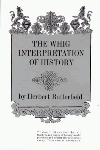The Whig Interpretation of History
One striking aspect of this classic essay from 1931 is its confidence in Progress, even though its author is clearly not among her admirers. Butterfield argues against a family of related historical fallacies that arise from searching the past to justify and glorify the present. If our concept of History is to study the Reformation for seeds of freedom, liberty, and modernity, then we are naturally led to admire the winners and deplore the losers, to cheer on revolutions (as long as they were successful) and to have no sympathy with conservatives who fought for defensive or delaying causes.
Sitting amidst the debris of Thatcher, Reagan, and Bush, we see the failures of Whig history are not necessarily Whiggish or liberal. A great deal of neoconservative thought, for example, suffers from Butterfield's malady. Whatever leads to the desirable aspects of the present validates the policies that won: Bush was right to invade Iraq because Saddam Hussein is no longer in power and, if he were, things would be worse than they are. When Macauley wrote that "the history of our country during the last hundred and sixty years is eminently the history of physical, of moral, and of intellectual improvement," this was the rhetoric of the moderate left. Somehow, its valence has changed; today, this is the Morning In America voice of the right. Presentism has moved from validating progress and science to supporting mysticism and nostalgia for an imagined past.
